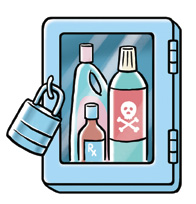It's important to keep poisons in a safe place at home and to know what to do in the event of a suspected poisoning.
The leading dangers for children under 6 years of age are:
-
Cleaning products including drain, oven, and toilet bowl cleaners, dishwasher and laundry detergents, and rust remover
-
Cough and cold medicines
-
Cosmetics, including perfume and makeup.
-
Fumes, gases, and vapors, such as carbon monoxide
-
Household plants, especially philodendron
-
Pain relievers
-
Paint thinner and paint remover
-
Pesticides
-
Prescription medicines
-
Vitamins, especially those with iron, which is very common in prenatal vitamins
-
Button batteries
-
Liquid nicotine refills used in e-cigarettes
Safety tips
Carefully go through each room of your house looking for harmful items. Make sure harmful items are kept well out of reach of children. Never leave such items on counters, on open shelves, on top of the refrigerator, on windowsills, or at the sink. The following information can serve as a guide as you poison-proof your home:
-
Keep medicines, pesticides, and detergents in their original containers. Never put non-food items in a food or drink container. To a toddler, furniture polish in an apple juice bottle can look like something good to drink.
-
Lock up all medicine and harmful substances. Also, keep them out of sight and out of reach, because safety latches or locks may malfunction. Don't underestimate a toddler's reach. A toddler can drag a chair to a counter, climb on it, and open a cupboard near the ceiling.
-
Correctly dispose of unused and or unneeded medicines.
-
Be careful with medicines carried in purses and briefcases.
-
Don't trust childproof tops to protect your child. A determined 2-year-old can get these open or break the bottle open by stomping on it.
-
Never refer to any medicine as "candy." It gives children a dangerous idea about medicine.
-
Be aware that colorful things (like laundry detergent pods) can look like candy to a child.
-
When you take your own medicine, do so in private. Children learn by watching.
-
When guests come to visit, remind them not to leave their medicine in reach of children.
-
When visiting a friend or relative with your child, be aware that their home may not be poison-proofed.
-
Make sure the carbon monoxide and smoke detectors in your home are working.
-
Store household products in a different place from food.
When to seek care
In the event of a suspected poisoning, call a poison control center (PCC). The nationwide number in the U.S. is 800-222-1222. This line is open 24 hours a day, 7 days a week, and is confidential. Don't induce vomiting. This can be harmful depending on what your child swallowed. Don't give your child any food unless told to do so.
Symptoms that indicate a possible poisoning include:
-
Odor of unknown substance on the breath
-
Severe throat pain
-
Breathing trouble
-
Unexplained nausea and vomiting
-
Burns on the lips or mouth
-
Drowsiness
-
Foreign substance around the mouth
Don't drive to the hospital until you have asked for advice. In some cases, seconds count, and what you do in the first few minutes can make a big difference. When you call, be prepared to tell what the substance was, how much was swallowed, and the age and weight of your child. If you know what container the poison came from, have it in front of you when you call. If you are told to go to the hospital, bring the container with you.
-
If your child is having convulsions, is unconscious, or is not breathing, call
911 right away. -
If the poison was inhaled, get your child to fresh air right away, then call the PCC.
-
If the poison is in the eyes, rinse the eyes with room temperature running water for 15 minutes, then call the PCC.
-
If the poison is on the skin, remove any contaminated clothing. Rinse the skin with lukewarm running water for 15 minutes, then call the PCC.
Featured in


